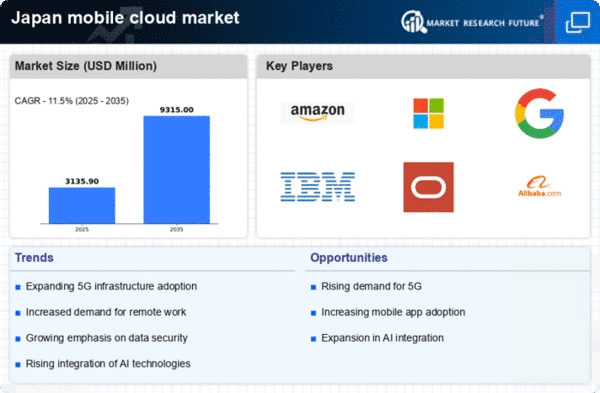Emergence of IoT Devices
The proliferation of Internet of Things (IoT) devices in Japan is a significant driver for the mobile cloud market. As of November 2025, it is estimated that there are over 1 billion connected IoT devices in the country, creating vast amounts of data that require efficient processing and storage solutions. Mobile cloud technologies are increasingly being utilized to manage this data, enabling real-time analytics and insights. Businesses are leveraging mobile cloud solutions to integrate IoT capabilities into their operations, enhancing efficiency and decision-making processes. The mobile cloud market is thus likely to benefit from this trend, as organizations seek to harness the power of IoT through cloud-based platforms that facilitate seamless connectivity and data management.
Growing E-commerce Sector
Japan's e-commerce sector is witnessing rapid growth, which is a key driver for the mobile cloud market. As of November 2025, e-commerce sales in Japan have reached approximately ¥20 trillion, reflecting a year-on-year increase of 15%. This growth is largely attributed to the increasing consumer preference for online shopping, which necessitates robust mobile cloud solutions to manage transactions, inventory, and customer data effectively. Retailers are increasingly adopting mobile cloud technologies to enhance their online platforms, ensuring seamless user experiences and efficient backend operations. The mobile cloud market is thus poised to capitalize on this trend, as businesses seek to leverage cloud capabilities to support their e-commerce strategies and meet the demands of a growing digital consumer base.
Rising Demand for Mobile Applications
The mobile cloud market in Japan experiences a notable surge in demand for mobile applications, driven by the increasing reliance on smartphones and tablets. As of November 2025, approximately 80% of the Japanese population utilizes mobile devices, leading to a growing need for cloud-based applications that enhance user experience and accessibility. This trend is further supported by the proliferation of 5G technology, which facilitates faster data transfer and improved connectivity. Consequently, businesses are increasingly investing in mobile cloud solutions to develop and deploy applications that cater to consumer preferences. The mobile cloud market is thus positioned to benefit from this rising demand, as companies seek to leverage cloud capabilities to deliver innovative mobile applications that meet the expectations of tech-savvy users.
Advancements in Cloud Security Solutions
The mobile cloud market in Japan is significantly influenced by advancements in cloud security solutions. As organizations increasingly migrate to cloud environments, concerns regarding data security and privacy have escalated. In response, the mobile cloud market is witnessing a surge in the development of sophisticated security measures, including encryption, multi-factor authentication, and real-time monitoring. As of November 2025, it is estimated that investments in cloud security solutions have increased by 25% in Japan, reflecting the urgent need for businesses to protect sensitive information. This focus on security not only enhances consumer trust but also drives the adoption of mobile cloud services, as organizations prioritize secure cloud environments to safeguard their operations.
Government Initiatives for Digital Transformation
The Japanese government actively promotes digital transformation initiatives, which significantly impact the mobile cloud market. With a focus on enhancing the country's technological infrastructure, the government has allocated substantial funding to support cloud adoption across various sectors. As of November 2025, government reports indicate that public sector investments in cloud technologies have increased by 30% over the past year. This push for modernization encourages businesses to adopt mobile cloud solutions, enabling them to streamline operations and improve service delivery. The mobile cloud market stands to gain from these initiatives, as organizations align their strategies with government objectives to foster innovation and efficiency in their operations.
















